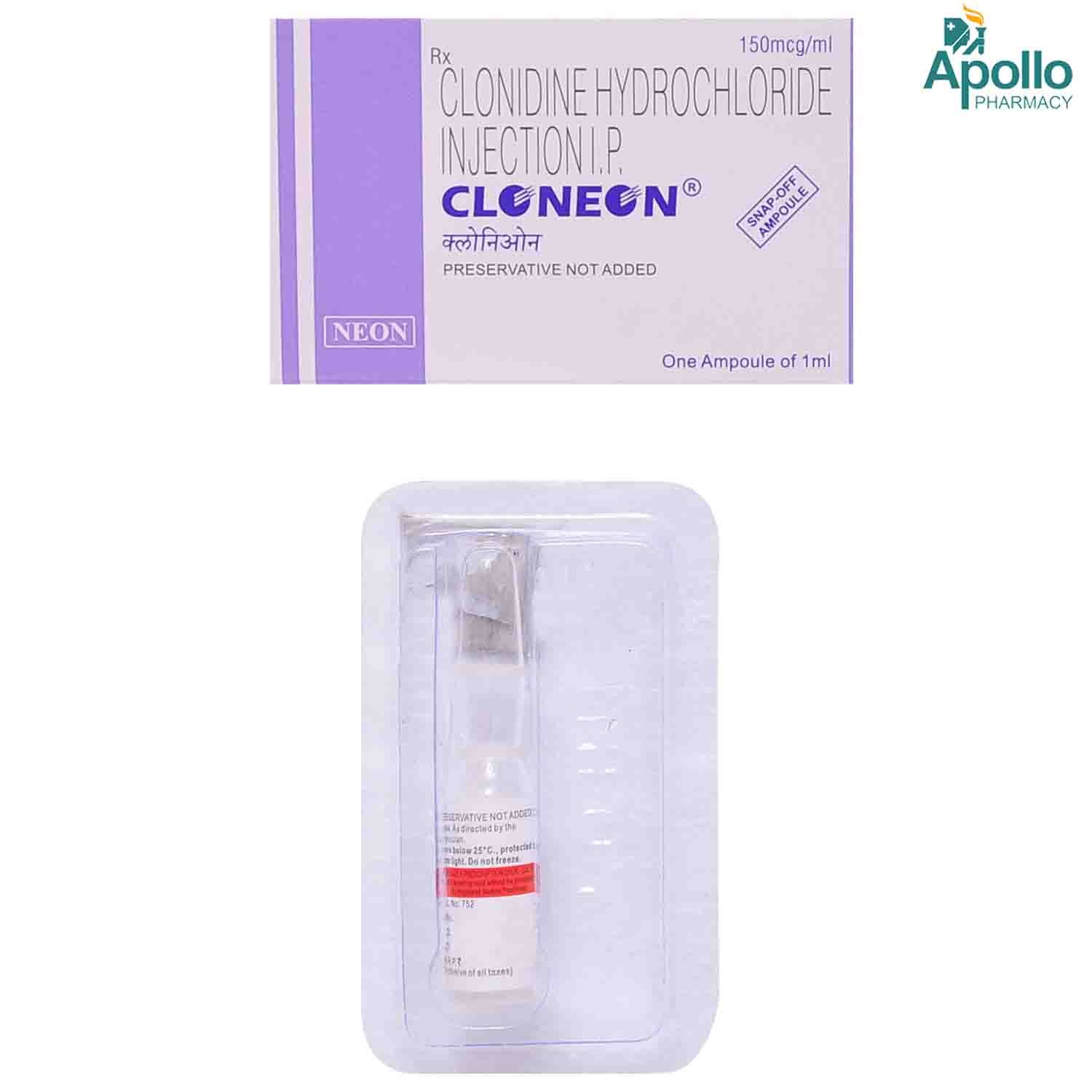Clonidine
About Clonidine
Clonidine belongs to the group of medicines called 'antihypertensives' used in the management of high blood pressure. Besides this, Clonidine is used alone or in combination with other medicines to treat attention deficit hyperactivity disorder (ADHD) in children above 6 years. Clonidine may also be used to prevent migraine attacks and similar types of headaches. It is also used to prevent hot flushes which may occur in women during menopause. Clonidine may also be used to treat post-operative pain, neuropathic pain, and chronic pain.
Clonidine contains 'Clonidine' that relaxes and widens the blood vessels making it easier for the heart to pump blood to all parts of the body. This, in turn, helps in decreasing the raised blood pressure and the risk of having a heart attack or stroke in future. Additionally, Clonidine helps in treating attention deficit hyperactivity disorder (ADHD) by affecting the part of the brain, which controls impulsivity and attention.
You are advised to take Clonidine for as long as your doctor has prescribed it for you, depending on your medical condition. In some cases, you may experience certain common side-effects such as headache, tiredness, dry mouth, weakness, nausea, vomiting, diarrhoea, and constipation. Most of these side-effects do not require medical attention and will resolve gradually over time. However, you are recommended to speak to your doctor if you experience these side-effects persistently.
Regular monitoring of blood pressure, electrolyte levels, and kidney functioning is advised while taking Clonidine. Consult your doctor if you are pregnant or breastfeeding. Clonidine is not recommended for children unless prescribed by a doctor. Avoid alcohol consumption while taking Clonidine as it might increase certain side-effects. Keep your doctor informed about all the medicines you are taking and your health condition to rule out any unpleasant side effects.
Uses of Clonidine
Medicinal Benefits
Clonidine belongs to the group of medicines called 'antihypertensives' used in the management of high blood pressure and attention deficit hyperactivity disorder (ADHD) in children above 6 years. It is also used to prevent migraine and hot flushes. Clonidine relaxes and widens the blood vessels making it easier for the heart to pump blood to all parts of the body. This helps in decreasing blood pressure and the risk of having a heart attack or stroke. Clonidine helps in treating ADHD by affecting the part of the brain, which controls impulsivity and attention. Clonidine may also be used alone or in combination with other medicines to treat post-operative pain, neuropathic pain, and chronic pain.
Directions for Use
Storage
Side Effects of Clonidine
- Headache
- Tiredness
- Dry mouth
- Weakness
- Nausea
- Vomiting
- Diarrhoea
- Constipation
Drug Warnings
Do not take Clonidine if you are allergic to any of its contents. Speak to your doctor if you have heart, kidney, or liver problems. Do not take Clonidine with medicines that affect the heart rate like epinephrine, diltiazem, verapamil and digoxin as it may cause arrhythmia (irregular heartbeat). Consult your doctor if you are pregnant or breastfeeding. Avoid alcohol consumption while taking Clonidine as it might cause unpleasant side effects. Inform your doctor if you have/had circulation problems, stroke, depression, diabetes, constipation, nervous problems, or irregular heartbeat. Try not to stop taking Clonidine on your own as abrupt withdrawal may cause rebound hypertension and symptoms such as agitation, nervousness, anxiety, headache, and restlessness.
Drug Interactions
Drug-Drug Interactions: Clonidine may have interaction with anti-hypertensives (atenolol, metoprolol, propranolol, prazosin), pain killers (tramadol, acetaminophen), antipsychotics (aripiprazole, quetiapine), anti-anxiety (lorazepam, alprazolam, duloxetine), anti-histamine (diphenhydramine), anti-convulsants (clonazepam, diazepam, pregabalin), and PDE-5 inhibitors (sildenafil)
Drug-Food Interactions: No interactions found/established.
Drug-Disease Interactions: Inform your doctor if you have depression, kidney dysfunction, or heart problems such as bradyarrhythmia, and low blood pressure.
Drug-Drug Interactions Checker List:
Safety Advice

Alcohol
unsafeYou are recommended to avoid alcohol consumption while taking Clonidine to avoid unpleasant side-effects.

Pregnancy
cautionIt is not known if it is safe to take Clonidine while you are pregnant. Please consult your doctor if you have any concerns regarding this; your doctor will prescribe you Clonidine only if the benefits outweigh the risks.

Breast Feeding
unsafeIt is not recommended to take Clonidine while you are breastfeeding. Please consult your doctor if you have any concerns regarding this; your doctor will decide whether Clonidine can be given to breastfeeding mothers or not.

Driving
cautionClonidine may impair your thinking and reactions. Drive and operate machinery only if you are alert.

Liver
cautionDose adjustment may be needed. Clonidine should be used with caution in patients with liver impairment/liver disease. Please consult your doctor if you have liver impairment or any concerns regarding this.

Kidney
cautionDose adjustment may be needed. Clonidine should be used with caution in patients with kidney impairment/kidney disease. Please consult your doctor if you have kidney impairment or any concerns regarding this.

Children
cautionClonidine is not recommended for children unless prescribed by the doctor. Clonidine is used alone or in combination with other medicines to treat attention deficit hyperactivity disorder (ADHD) in children above 6 years.
Habit Forming
Diet & Lifestyle Advise
Hypertension:
- You are advised to consume low salt and low-fat diet while taking Clonidine.
- Regular exercise is also recommended to complement treatment with Clonidine.
- Eat a diet rich in whole grains, vegetables, and fruits.
- Avoid smoking and alcohol consumption.
- Maintain a healthy weight with proper diet and exercise.
- Managing stress with meditation, yoga, and massage would also help treat high blood pressure.
Attention Deficit Hyperactivity Disorder (ADHD):
- Regularly attend behavioural therapy sessions.
- Rest well. Get optimum sleep.
- Exercise regularly and maintain a healthy weight by following a balanced diet.
- Avoid stress by practising yoga and meditation.
Migraine:
- Maintain a healthy diet and exercise regularly helps in improving overall health and boosts self-esteem.
- Avoid bright lights, loud noise, and extreme temperatures.
- Perform meditation and yoga. This helps in relieving stress and provides relaxation.
- Follow a regular sleep pattern to improve the amount and quality of sleep you get.
- Massage your scalp to ease the pain.
- Lie down in a quiet, darkroom.
- Place a cold cloth over your forehead or neck.
- Avoid smoking, alcohol, and caffeinated drinks.
- Learn what triggers your migraine and try avoiding them.
- Stay hydrated. Drink plenty of fluids.
- Learn relaxation skills as they help in reducing stress.
Special Advise
- Regularly monitor blood pressure levels to prevent hypotension (low blood pressure).
- Get up slowly while rising from lying or sitting position as Clonidine may cause dizziness.
- To treat your condition effectually continue taking Clonidine for as long as your doctor has prescribed it. Try not to stop taking it on your own as it may cause a sudden increase the blood pressure, chest pain or heart attack.
- Do not skip any doses or stop taking Clonidine suddenly without consulting your doctor as Clonidine may cause withdrawal reactions like anxiety, headache, tremor, agitation, and rise in blood pressure.
- Regular monitoring of blood pressure, electrolyte levels, and kidney functioning is advised while taking Clonidine.
Patients Concern
Disease/Condition Glossary
High blood pressure (hypertension): It is a condition in which the blood exerts increased pressure on the walls of blood vessels leading to hypertension. This condition can lead to hardened arteries (blood vessels), decreasing the blood and oxygen flow to the heart. Raised blood pressure can cause chest pain (angina) and heart attack (when blood supply to the heart is blocked). Additionally, high blood pressure also causes brain damage (stroke) and kidney failure. Symptoms of high blood pressure include headache, dizziness, nose bleed, changes in vision, chest pain, weakness and dyspnoea (shortness of breath). However, most of the time, the signs and symptoms of hypertension are none.
Attention Deficit Hyperactivity Disorder (ADHD): It is a mental health disorder that causes hyperactivity and impulsive behaviour. People having ADHD have trouble focusing their attention on a single task or sitting still for a longer time. It often begins in childhood and lasts through adulthood. Symptoms of ADHD include limited attention and hyperactivity.
Migraine: Migraine is a neurological condition which is characterised by an intense, debilitating headache. Hormonal changes, stress, lack or excess of sleep, bright lights, loud sounds, and certain foods and drinks can trigger migraine headaches. Symptoms of migraine include throbbing pain in one particular area with varying intensity, nausea, vomiting, numbness or tingling sensation, difficulty speaking, and sensitivity to sound and light.
Hot flushes: Hot flushes are one of the most common symptoms of menopause and perimenopause. Symptoms include profuse sweating and a sudden feeling of warmth generally over the face, chest, and neck.
Pain: It is a symptom triggered by the nervous system, causing uncomfortable sensations in the body. Pain may be dull or sharp; it might be constant or may come and go. The common causes of pain include headache, muscle strain, cramps, cuts, bone fractures, arthritis, stomach ache, and certain medical conditions.
FAQs
Clonidine relaxes and widens the blood vessels making it easier for the heart to pump blood to all parts of the body. This helps in decreasing blood pressure and the risk of having a heart attack or stroke. Clonidine helps in treating ADHD by affecting the part of the brain, which controls impulsivity and attention.
Dry mouth could be a side-effect of Clonidine. Limiting caffeine intake, avoiding smoking and mouthwashes containing alcohol, drinking water regularly, and chewing sugar-free gum/candy might stimulate saliva and prevent drying of the mouth.
Please do not stop taking Clonidine without consulting your doctor as it may lead to a rise in blood pressure. Continue taking Clonidine for as long as your doctor has prescribed it to you. Do not be reluctant to speak with your doctor if you experience any difficulty while taking Clonidine.
Diarrhoea might be a side-effect of Clonidine. So, it is advisable to drink lots of fluids and eat non-spicy food if you experience diarrhoea. If you find blood in stools (tarry stools) or experience severe diarrhoea, consult your doctor. Do not take anti-diarrheal medicine on your own.
You are advised to inform the doctor that you are taking Clonidine if you are due to undergo any surgery or medical procedure. Clonidine can be taken up to 4 hours before surgery. Try not to take it within the 4 hours before your surgery. However, you can restart it right away after surgery.
Combining heart rate-controlling drugs (like digoxin, epinephrine, diltiazem and verapamil) with Clonidine can slow your heart rate. So, consult any heart specialist or cardiologist before using both drugs together.






